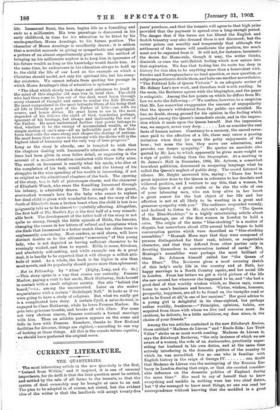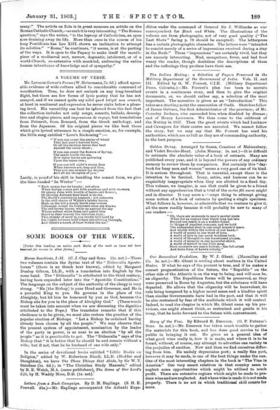CURRENT . LITERATURE.
THE QUARTERLIES.
The most interesting article in the new Quarterly is the first, "-Ireland from Within," and if inspired, it is one of unusual' importance, for its drift is that the land question must be settled, and settled by the sale of all farms to the tenants, so that the system of dual ownership may be brought at once to an end. The plan to be adopted is, of course, not stated, but the evident idea of the writer is that the landlords will accept twenty-five 1 years' purchase, and that the tenants will agree to that high price provided that the payment is spread over a long-enough period. The danger that if the terms are too liberal the English and Scotch tenantry may also demand them is not discussed; but the writer points out sensibly and temperately that although the settlement of the tenure will ameliorate the position, too much must not be expected from it. It will not, for instance, terminate the desire for Home-rule, though it may, the writer thinks, diminish or cure the anti-British feeling which now enters into that aspiration. We fear that feeling has its roots too deep in history for this idea to be anything more than a benevolent wish. Swedes and Norwegians have no land question, or race question, or religions question to divide them, and hate one another nevertheless. "The Political Life of Queen Victoria" is an adequate review of Mr. Sidney Lee's new work, and therefore well worth reading. In the main, the Reviewer agrees with the biographer, and the paper is eulogistic. Among the few points on which he differs from Mr. Lee we note the following :—" We confess, however, to a suspicion that Mr. Lee somewhat exaggerates the amount of unpopularity that the Queen's withdrawal from the public eye entailed. He has, no doubt, strong ground for his opinion in the feeling which prevailed among the Queen's immediate circle, and in the impres- sion which it made upon the Queen herself. But the impression was, we suspect, never very deep Let us consider the real facts of human nature. Constancy to a memory, the sacred rever- ence paid to the affection of a life, these may cause a passing irritation when they jar upon the petty enjoyments of the hour ; but none the less, they move our admiration, and provoke our deeper sympathy." He quotes an anecdote also quoted by Mr. Lee, to which apparently he gives more weight as a sign of public feeling than the biographer. At a meeting in St. James's Hall in December, 1866, Mr. Aytoun, a somewhat truculent politician, denounced in unsparing language what he called the Queen's neglect of public duty. The crowd listened in silence. Mr. Bright answered him, saying : "There has been great injustice done to the Queen in reference to her desolate and widowed position, and I venture to say this, that a woman, be she the Queen of a great realm or be she the wife of one of your labouring men, who can keep alive in her heart a great sorrow for the lost object of her life and her affection is not at all likely to be wanting in a great and generous sympathy with you." The audience responded warmly, and declined to listen to Mr. Aytoun's . apology. "The Queen of the Blue-Stockings " is a highly entertaining article about Mrs. Montagu, one of the first women in London to hold a salon. The origin of the name "blue-stocking" is a matter of dispute, but somewhere about 1770 several ladies began to hold conversation parties which were described as "blue-stocking assemblies." "Hannah More says that they were composed of persons distinguished for their rank, talents, or respectable character, and that they differed from other parties only in devoting themselves to conversation instead of cards." Mrs. Montagu's assemblies were perhaps the most brilliant of these. Dr. Johnson himself called her "the Queen of the Blues." The Reviewer gives a most amusing sketch of . this lady's early life in the country and at Bath, her happy marriage to a North Country squire, and her social life in London. From her letters we get a vivid picture of the life she saw around her wherever she happened to be, and "she had a good deal of that worldly wisdom which, as Bacon says, comes home to men's business and bosoms. 'Virtue, wisdom, honours, prosperity, happiness, are all to be found on the turnpike road or not to be found at all,' is one of her maxims." Her good advice to a young girl is delightful in its clear-sighted, but perhaps rather worldly, frankness:—" Principles, opinions, habits, are acquired from those with whom we live and converse most. Be cautions, be delicate, be a little ambitious, my dear niece, in the choice of your friends."
Among the ten articles contained in the new Edinburgh Review, those entitled "Madame de Lieven" and "Emile Zola: Les Trois Vales" strike us as most worth reading. Madame de Lieven is, says the Edinburgh Reviewer, "the only instance of which we are aware of a woman, the wife of an Ambassador, practically super- seding her husband in his own duties, and at the same time actively interfering in the domestic politics of the country to which . he was accredited. For no one who is familiar with English history in the reign of George IV can doubt that Madame de Lieven was the mainspring of the Russian Em- bassy in London during that reign, or that she exerted consider- able influence on the domestic politics of England during the same time." She used to say of herself that to know everything and meddle in nothing were her two chief duties, but" if she managed to know most things, no one can read her Correspondence without knowing that she meddled in a great
many." The article on Zola is in great measure an article on the Roman Catholic Church,—as such it is very interesting. "The Roman question," says the writer, "is the leprosy of Catholicism, an open sore draining away its life. More than once in the course of his long Pontificate has Leo XIII. shown an inclination to attempt its solution." "Rome," he continues, "it seems, is at the parting of the ways. It is open to the Papacy to make itself the mouth- piece of a mediaeval sect, narrow, dogmatic, intolerant, or of a world-Church, co-extensive with mankind, embracing the entire human inheritance of knowledge and of sympathy."























































 Previous page
Previous page